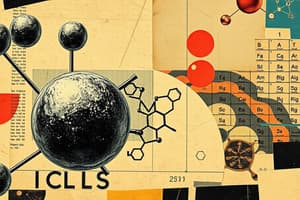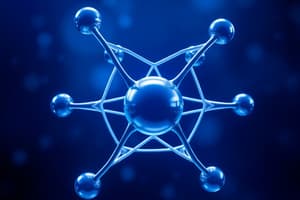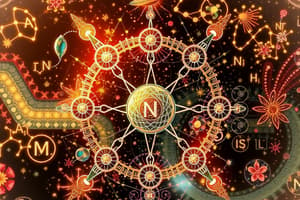Podcast
Questions and Answers
An atom consists of a nucleus and several rotating ______
An atom consists of a nucleus and several rotating ______
electrons
The nucleus contains heavy particles called ______ and neutrons
The nucleus contains heavy particles called ______ and neutrons
protons
Scientists use a periodic table to classify and organize different elements based on the number of ______ in their nuclei
Scientists use a periodic table to classify and organize different elements based on the number of ______ in their nuclei
protons
Molecules are made up of atoms, which combine to form various substances, including living ______
Molecules are made up of atoms, which combine to form various substances, including living ______
Flashcards are hidden until you start studying
Study Notes
- The speaker is discussing the concept of atoms as the fundamental building blocks of all matter.
- Atoms are too small to see with the naked eye, even with a regular microscope.
- An atom consists of a nucleus and several rotating electrons.
- The nucleus contains heavy particles called protons and neutrons.
- Protons have a positive electrical charge, while neutrons have no charge.
- Electrons, which are very small particles, surround the nucleus and are responsible for electricity.
- The electron is not close to the nucleus; it is much farther away, around 500 meters.
- Atoms are mostly empty space.
- Everything that can be touched and felt is made up of atoms.
- Atoms combine to form molecules, which make up various substances, such as water (H2O) and salt (NaCl).
- Scientists use a periodic table to classify and organize different elements based on the number of protons in their nuclei.
- There are 92 naturally occurring elements, which can be used to create a variety of interesting molecules.
- Scientists study the inside of atoms using giant machines and particle accelerators to gain new insights into their structure and composition.
- Quarks are the fundamental particles that make up protons and neutrons.
- Matter and energy are interconnected; everything in the universe is either energy or matter.
- Molecules are made up of atoms, which combine to form various substances, including living organisms.
- Carbon is a key element that is essential for life and is found everywhere in the natural world.
- Atoms are uncuttable and are called "atoms" from the Greek word meaning "uncuttable."
Studying That Suits You
Use AI to generate personalized quizzes and flashcards to suit your learning preferences.




